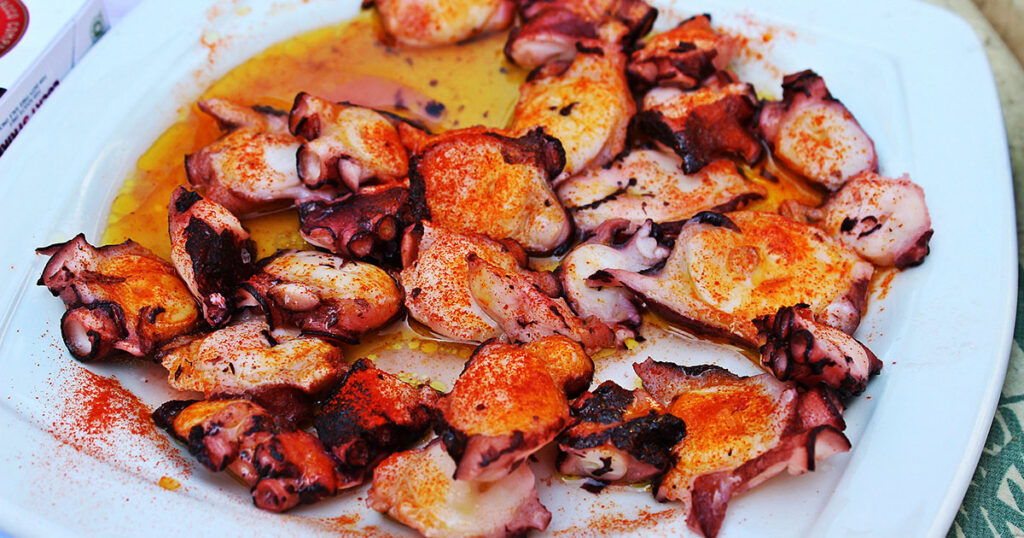
Growing up as I did in a small town far from the sea, I wasn’t used to the tanks of live crustaceans, usually crabs or lobsters, such as you sometimes see on display in a seafood restaurant window in Gijón or in a big-city grocery store. The murky water, the rising bubbles, the long-bodied lobsters and saucer-like crabs, the banded claws, the shifting, heaving, greeny-gray splotched heap of them on the tank floor, not lifeless but evidently hopeless, save for one poor sap wriggling under the weight and another struggling across the bodies of its brethren, beady eyes staring and feelers waving—ugh. I turn away. “Poor things,” I think. But when I see an octopus in a tank, or, even sadder, the slumped lifeless creature across a slab of marble in the fish shop, I think worse. I think, “Poor fellow.”
Pulpo a la gallega, octopus prepared Galician style, is such a popular dish that whole restaurants, called pulperías, are dedicated to it. It’s quite delicious. Thirty years ago, I avidly ate the chewy rounds of flesh, pearly white in the middle, the outsides pinky purple with a hint of orange, the suckers either whole or parted by the knife, served doused with olive oil and sprinkled with paprika on a wooden plate, steamed potatoes on the side. But nearly 30 years ago, I gave up pulpo, along with meat.
Why fish but not chicken, I’ve been asked of my eating habits. Why shrimp but not beef or pork? Why squid but not octopus? My interrogators might actually be curious, the way I am about a system I don’t understand: Why a gear and not a piston? Why gasoline here but diesel there? Generally though, people asking are intent on finding a flaw in the rules. So I’m always on the lookout for a rule to keep the pursuers at bay. In January, a man in a group of us at a restaurant mentioned as we left, patting our full bellies, that his New Year’s resolution was to eat nothing with a face. I wish that could be my rule. But I eat fish, despite their pouty lips and staring eyes. Just not lobster, and certainly not octopus.
An octopus is fished with a special hooked instrument, a sort of harpoon on which it’s impaled and then scooped up. That’s reason enough, I suggest, for not eating them.
But a fish, I am reminded, is yanked writhing from the waters, tossed on deck to flip and flop and gasp. “What’s the difference?” I’ve been asked.
It’s the legs gathered about the creature, eight of them! It’s the big head, it’s the backing into a corner. For the crustaceans, it’s the shackled appendages, the trussed-up body, the notion I have on looking into their tank that they’ve been abducted and thrown into a cell to await their fate. I don’t want to be that fate, coming for them, peering in.
What do they see? Warped by the glass and water, my face distorted, my cheeks heavy, my eyes bulging, the picture of appetite and greed. No, I don’t want that, anything but that, even if it’s just lettuce or a carrot, or a handful of nuts. And when asked, “Don’t you feel sorry for that lettuce?” I’ll admit I would if lettuces actually rolled over in their crates. I hope they don’t.

